8 Best Tips to Protect Outdoor Security Cameras like a Pro
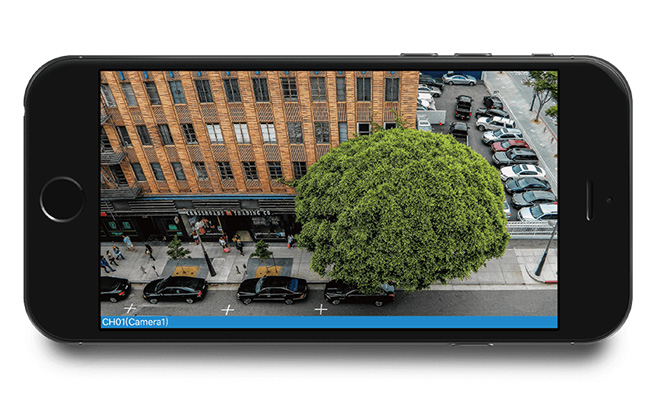
When it comes to outdoor security cameras and systems protection, people often ask these common questions: how do people keep bugs or spider away from security cameras? How do people protect CCTV camera from rain? Or, how do users protect outdoor security cameras from theft or damage? Today we share some easy fixes to these common issues and some great tips to protect your outdoor PoE cameras, or wireless outdoor video security cameras.
To protect outdoor security cameras, here is what you need to know:
- Pro Tips to Protect Outdoor Security Camera from Theft
- Top Ways to Keep Spiders & Bugs Away from CCTV Cameras
- How to Protect CCTV Cameras & Wires from Rain
- How to Reduce Outdoor IP Camera IR Reflection
- Useful Solutions to Foggy Outdoor CCTV Cameras
- Top Tips to Protect IP Cameras from Lightning
- How to Stop Outdoor Security Cameras from Being Hacked
- How to Solve Outdoor IP Camera Image Problems
Question1: How to Stop Outdoor Security Camera Being Vandalized, Blinded, or Stolen
Outside CCTV or IP video security cameras are vulnerable to vandalism and theft because shrewd thieves or intruders try to cover their tracks by dismantling, blinding, damaging or stealing CCTV surveillance cameras or the NVR/DVR.
Solutions:
To prevent an outdoor surveillance camera from being stolen, place it out of arm’s reach like up on the walls, soffit, the overhang of the roof, or under the eave, mount it into the wall with screw mount or security mount (Click here to find more prefect installation spots for security cameras).
Also, you may place the NVR/DVR in the bookshelf, cupboard and any other hidden positions to prevent theft.
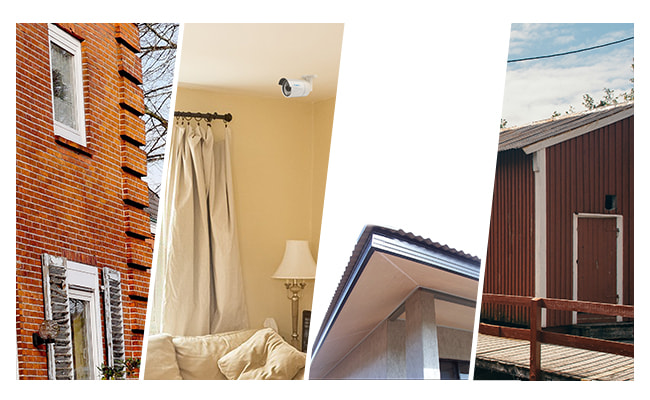
Or use surveillance camera metal housings/cover like this one, which helps protect the camera and lens, keep the CCTV or IP security camera clean, and prevent security cameras from being stolen.
To make outdoor security camera tamper-proof and avoid being blinded by flashlight or laser pointer, you could also convert it to black and hide it from sight, like one Reolink user did with his RLC-423 PTZ outdoor camera.
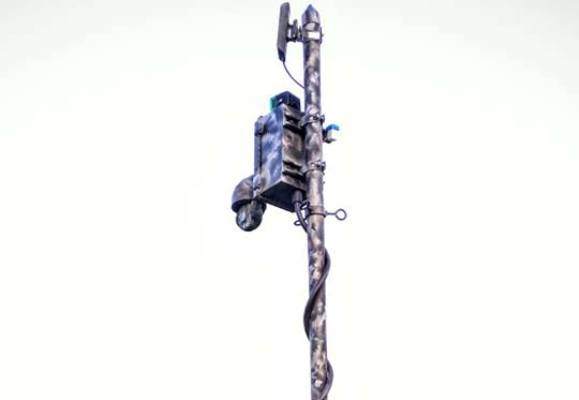
Or using skins or camouflage cover for outdoor security cameras, for example, Reolink Argus 2 outdoor battery-powered security camera camouflage skin suit.
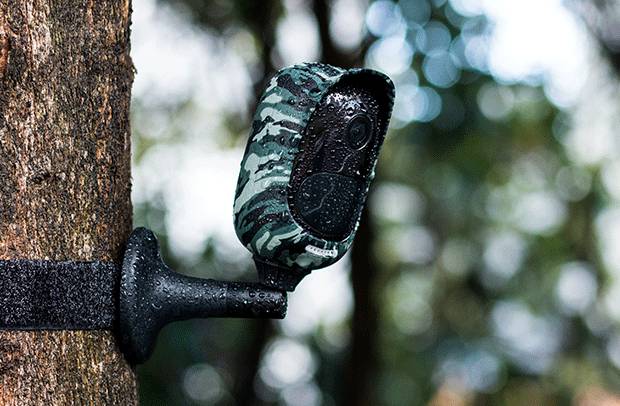
[Updated] Another solution on how to protect CCTV cameras from theft is to hide them in birdhouses just like this genius homeowner does.
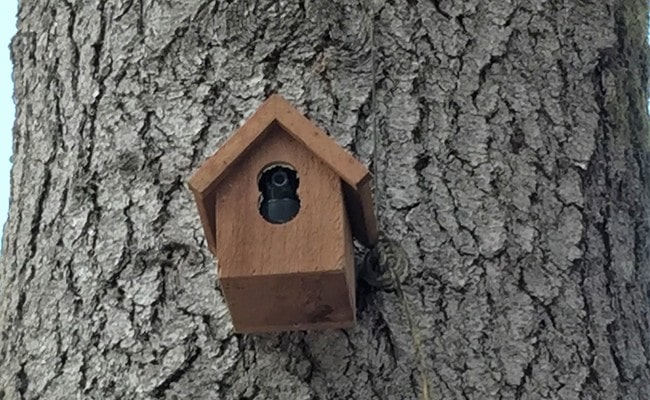
You may check this post out and find more feasible ways to conceal your outdoor security cameras from intruders' sight.
Question 2: How to Keep Spider Webs, Bugs, or Insects away from Security Cameras
Outdoor security cameras for a home-like infrared front door security camera, outdoor CCTV camera with IR night vision in the backyard or driveway sometimes come with an infrared light or floodlight at night, which will attract mosquitoes, moths, bugs or other insects over time.
Soon, your outdoor CCTV camera or external security cameras will be covered by spiderweb, dead bugs or insects.
And these obnoxious spider web & cobweb will start getting annoying for it not only blocks the external camera's view but also triggers false alerts, especially for outdoor motion sensor security cameras.
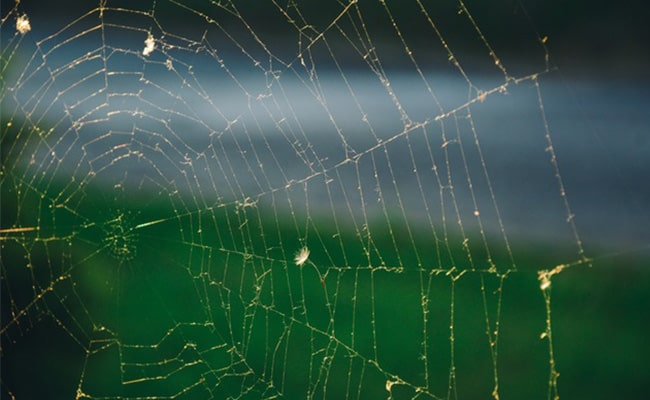
Solutions:
To keep bugs away from your outdoor video surveillance camera, use bugs spray or insecticide like Bifen around the housing/cover of the camera might work. Alternatively, users could turn off IR LEDs or get external IR light/lamp like this one.
To stop the spider from making a spider web on the external security camera or system, some users do suggest using petroleum jelly on the area surrounding the camera.
Meanwhile, some natural insect repellents could also help keep spider from making cobwebs on the exterior camera, for example, citrus, eucalyptus, lavender, peppermint.
Spider/insect repellents for the camera, contact sprays, aerosol sprays and web eliminators around the wireless outdoor security cameras but not directly to the lens, for example, Permethrin, will help exterminate bug infestation.
Another way to keep bugs away from security cameras is to regularly clean the camera exterior, housing, enclosures, cover, or shield with a soft-bristled brush, which also helps keep the outdoor surveillance camera clean.
Ready. Set. Save!
Big selection, big SAVING. Get your hands on Reolink security cameras & systems before the best prices slip away!
Question 3: How to Protect Outdoor Camera from Cold Winter, Hot Summer, or Rain
When you are in areas with very cold winter hitting below zero or hot summer hitting 105°F, your video surveillance system or wireless outdoor security cameras could potentially suffer if they are not designed to work in sub-zero cold weather or scorching hot summer.
Besides, there are all sorts of weather conditions & elements that you need to protect your outdoor cameras from.
Solutions:
First of all, check the outdoor security camera housing IP (ingress protection) rating, which indicates the ability to withstand elements.
For example, an outdoor surveillance camera with IP rating 66 can withstand the impacts from solid matter like dust and liquid-like rainwater, which could be rendered as completely water-proof.
And check the working temperature of the video surveillance cameras either CCTV camera or network IP cameras.
Many outdoor home security cameras, like Reolink RLC-410 outdoor security camera, normally works in temperature ranging from 14°F to 131°F (-10˚c - +55˚c) with the humidity level around 10%~90%.
In addition, you could also get an additional security camera rain cover or housing/box/enclosure to protect outdoor home security cameras (wireless or wired) from rainwater, snow, dust, heat and other elements.
Apart from camera protection, when the wired outdoor cameras (PoE or CCTV) is out in the open like on a pole, deck, pier, or other outdoor locations, cables and connectors should be waterproofed with the cable connector waterproof lip or plastic conduit. And for outdoor cable, go for durable and outdoor-rated cables, for example, the gel-filled Ethernet cable is great for PoE IP cameras too.
Another feasible way to protect security camera wires from rain is to use junction boxes to conceal the cables and connectors from sight.
If you don't plan to use conduits or junction box, remember to conceal the holes as well. Or else, the moisture may run along the surface of the electrical cable and get right into the electrical connection points, which may result in a great trouble and a costly repair.
Take the two useful tips below to cover security camera wire holes in the wall:
- Fill the holes with waterproof materials like silicone and duct seal.
- Leave drip loops to prevent water from running to the power outlets through the hole.
- Use waterproof outdoor covers or feed-through bushings to conceal the holes.
[Updated] Besides, in extremely cold weather, it's important to check camera enclosure and make sure there is no moisture or condensation inside the enclosure or put a packet of silica gel inside the housing case. Apart from the camera, cables and connectors can be protected from frost or snow, checking and making sure the cables and connectors in a good shape on a regular basis.
Hold Up: Click here to learn practical tricks to run outdoor CCTV cameras in extreme cold areas.
Question 4: How to Deal with Security Camera IR Glare & Light Reflection
When an outdoor-mounted security camera is pointing at the reflective surfaces, for example, ponds of water, glass panels or car windows, it will cause lens glare and obstruct viewing.
Sometimes, the window could be the culprit of obscurity or whiteout on your image when the camera is placed inside the house.
Solutions:
To avoid the snag, place your front door or back door security camera outside your house to achieve better viewing.
To prevent reflection of lights and infrared flare, it’s advisable to adjust your outdoor surveillance camera viewing angel or shy away from reflective objects.
Here are more great tips about using security cameras through glass or glass window, for example, using anti-glare film for windows, using external IR illuminator, placing it on the window sill.
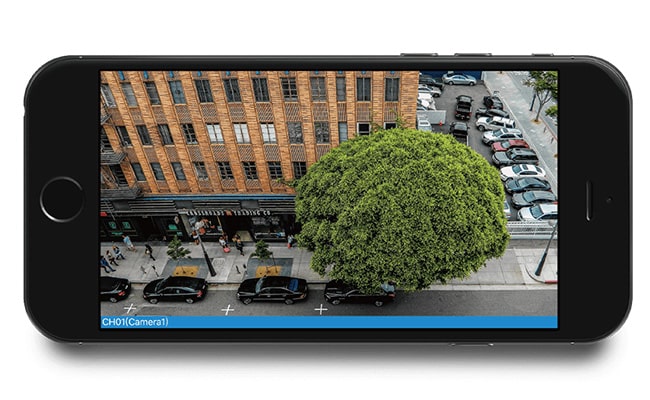
Question 5: How to Stop Security Camera Fogging, Clouding, or Condensation
Security video cameras are normally sealed up and air-tight while being assembled, which surely reduces the chance of moisture seeping into the lens.
However, some users said their outdoor dome security cameras sometimes start fogging up at night and there is moisture, condensation inside the camera housing.
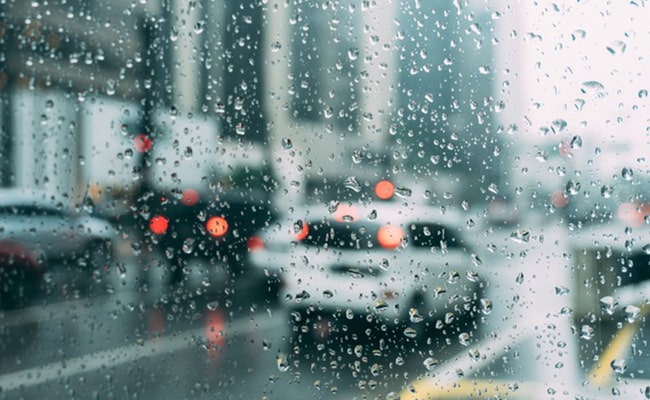
One user said the driveway camera starts fogging up and obscuring the image in the early morning.
Solutions:
A fogging problem which occurs in the early morning sometimes will go away itself, so there is no need to clear the surface.
Sometimes, the issue stays for a long time, the solution to internal condensation would be placing a packet of silica gel inside the housing case.
Sometimes condensation happens because the outdoor dome camera is not well-sealed. Try cleaning the dome camera inside and out first and press the foam ring firmly against the glass.
Regular wiping the outer lens covers with a micro-fiber cloth will protect your external surveillance camera.
Showdown: Click here to find more practical tips on how to stop security camera from fogging up.
Question 6: How to Protect Outdoor Security Camera from Lightning and Thunderstorm
Think ahead before the lightning strike ruins your valuable equipment.
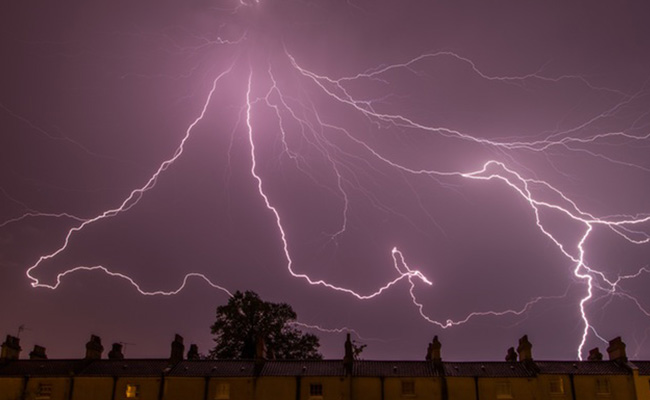
Recently, a homeowner has shared her experience of her home being struck by lightning with security camera going berserk - video loss, electrical currents horizontal lines running across the screen (hum bars) or complete freeze or shutdown.
Solutions:
Avoid mounting WiFi outdoor security camera to a metal pole because metal could be highly conductive in times of power spike and use security camera weather shield.
Make sure your wired outdoor security system (CCTV or PoE security system) is grounded properly, which can minimize damage by redirecting immerse lightning current into the earth ground rather than discharging them by virtue of frying your security camera.
Lightning surge protectors will stop voltage spikes and surges by blocking voltage levels exceeding specific thresholds and channeling extra voltage into the outlet’s ground line.
UPS (Uninterruptible Power Supplies) units will ensure power supply for the camera when experiencing a power outage, mitigating concerns for camera power-off.
If living in areas where a thunderstorm is a common occurrence, you could click here and learn more about how to protect outdoor security system from lightning.
Question 7: How to Avoid IP Security Camera Being Hacked or Watched
One of the vulnerabilities of network IP camera is the possibility of being hacked by ill-intentioned people either by jamming the wireless outdoor security cameras or decrypting your safety code.
Solutions:
The solution to the problem is to boost your network with WPA2 (Wi-Fi Protected Access II) security protocol.
Changing your passwords frequently and making your passphrase complicated is vital to secure your outdoor video security system.
Updating your outdoor property security camera firmware frequently helps address the loopholes and vulnerability. (Learn more about how to update your camera firmware)
Find out more about how to secure your CCTV or IP security camera from hacking.
Question 8: How to Deal with Outdoor Security Cameras Image Problems
If your security cameras like the wireless outdoor security camera and outdoor PoE camera constantly or occasionally experience some issues with the videos/images like video loss, no videos, images flickering, rolling lines on the screen, black screen at night, etc.
Solutions:
Check outdoor security camera cables to see if they are in good condition and not damaged or frayed. Here are some common tips to troubleshoot security cameras like checking camera power/connections, rebooting the camera, factory reset cameras, turn to their tech support.
Don't mount your outdoor security cameras on a metal surface or conductive surface, for which will generate electrical interference that impacts camera videos and images. Try using a block of wood in between if you have to.
Search
Subscribe for the Latest Updates
Security insights & offers right into your inbox

